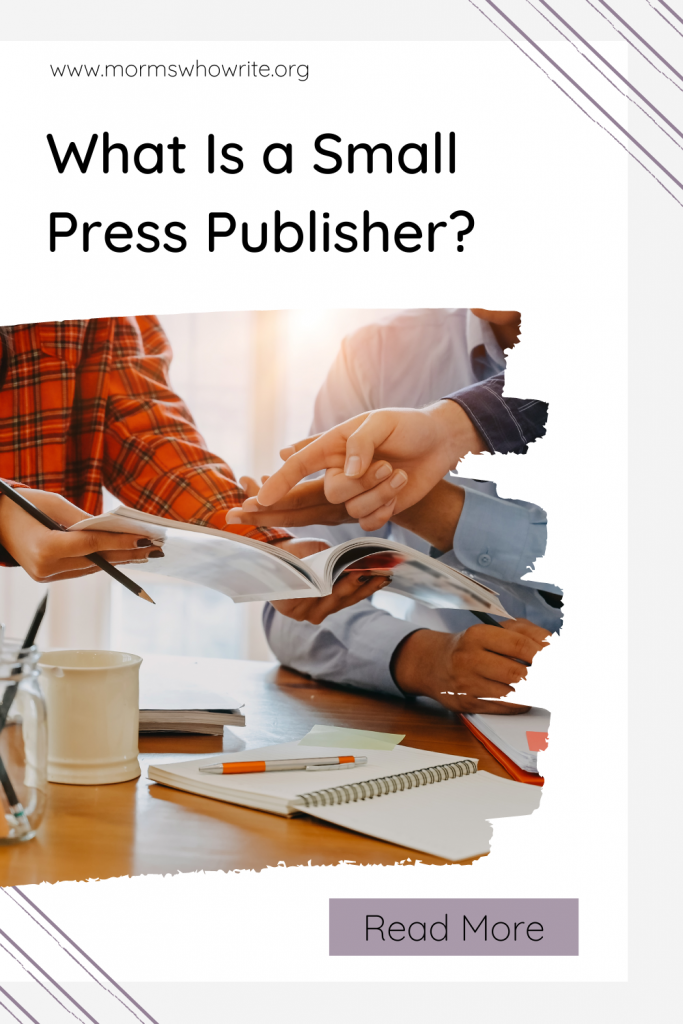Writing the final draft of your book is one beast. Deciding how you want to publish it is another. In 2022, writers can publish their books in several ways other than the traditional publishing route. One option growing in popularity is going with a small press publisher.
Not sure what a small press publisher is or if it’s right for you? Let’s cover the basics.
What is a small press publisher?
The book world categorizes publishing houses by their annual revenue. A small press publisher makes less than $50 million a year, while a large press, such as Penguin Random House or HarperCollins, brings in over $3 billion.
Small presses can sometimes be sub-categorized into micro-presses. A micro-press puts out a select number of books every year, typically in lower volumes. Sometimes only 20 copies of one book!
What a small press is not
Small press publishers are not imprints. An imprint press is a small publishing company under the umbrella of a traditional publisher. For example, Avon Books. This publisher is an imprint press of HarperCollins. It’s one of the premier romance houses that work with many well-known romance authors. However, Avon Books is not a small press, as it’s still associated with HarperCollins and its funding capabilities.
Authors under a small press are not self-published. Granted, some small presses offer indie publishing services, such as Our Galaxy Publishing. But authors who sign a contract to be represented by a small press publisher do not have to worry about every detail of the publishing process as self-published authors do.
Finally, a small press is not a vanity press. Vanity presses are publishers who expect authors to pay them for publishing services. Small presses make their money on the profit from their author’s books, not from fees for service.
The pros of working with small press publishers
If you’ve been thinking of exploring the world of small press publishing, here’s why it might be the right move for your book.
Unagented Authors
Small press publishers are more likely to take a chance on un-agented authors. Landing an agent is wonderful, but it’s competitive and stressful, especially since the pandemic when everyone wrote a book! Not all small presses will accept un-agented submissions, but you have more of a chance than submitting to a traditional publisher.
Creative Control
Unlike publishing your book with the Big 5 traditional publishers, going with a small press is a more intimate experience. Authors tend to maintain more creative control over their books and have deeper conversations with their publishers about their goals. Larger publishers can manage to take complete authority over your story without permission from the author, as outlined in their contract.
Unique Story Representation
Small press publishers are not afraid to take a leap and represent unique stories. Traditional publishers love the cookie-cutter plots that always sell, the ones that readers repeatedly buy because they know what they’re getting and love it.
But small press publishers are going for imagination. They want the stories that make people stay up until 3 a.m. to finish. The obscure and sophisticated plots that writing groups debate for years after release.
Possibility of Higher Royalties
Small press publishers do not charge as high of a percentage as traditional publishers when it comes to royalties. If your book really takes off, you could end up making more in the end than you would with the massive cut a Big 5 company takes from your profit.
Less Formatting Stress
Indie authors who self–publish their books have to do it all. Not only do they write the book, but they also figure out the cover design, format the book, upload the book and seek out their own betas and alphas, and editors. Everything.
Going with a small press can help relieve some of the non-writing stress. While you will still be expected to put a ton of effort into marketing your book, small presses will generally take the other tasks of making the tangible book off your hands.
The cons of going with small press publishers
We love small presses, and we know some amazing Moms Who Write who run their own. But when considering how to publish your books, it’s good to have ALL of the facts. Here are some reasons for deciding not to go with a small press publisher.
Smaller Marketing Reach
This isn’t always the case. Every small press is different, and every book is different. But generally speaking, small presses have a much smaller reach than the Big 5. Traditional publishers have billions of dollars in marketing income to push your book into every book store nationwide. They have access to every major book website and can place your cover in the face of every reader in the book world (if they want to). Small press publishers work with smaller budgets, so their reach is typically not as large.
Book Advances
Because small presses have less revenue to work with, you may not receive a book advance. The amount will certainly be smaller than the advance you would see with a traditional publisher if you do. But again, every book will be different.

Small Business Troubles
This has happened to a few authors we know, and it’s hard on everyone. Small press publishers are essentially small businesses, and if we’ve all learned anything about the chaos ensuing from 2020-2021, it’s that nothing is ever guaranteed.
Just like any other small business, a small press publisher is run by hardworking entrepreneurs that may encounter financial difficulty, staffing shortages, publishing disasters, and other business struggles from time to time. There is a higher chance of a small press shutting down because of these issues than a traditional publisher going bankrupt. Just something to keep in mind.
Scams and Bad Presses
Sad as it is, there are some small press publishers who are out there just looking to scam authors out of money and ideas. Others may simply be poorly run. Small press publishers can be harder to vet. If you’re considering this route, make sure you do thorough research before submitting your manuscript or signing any contracts.
Final thoughts on small press publishers
Still not sure if a small press publisher is right for you? Don’t feel bad; this is a big decision.
Thankfully, our online community is full of published authors who have taken every route and who love to discuss their experiences. Drop your thoughts in our Facebook group to talk to small press publishers or small press-published authors to get more input.
About the Writer: Shell Sherwood is a poet, fiction writer, freelancer, and creator of silly children’s stories who could live on coffee, pastries, and romantic tragedies. She lives in Hudson Valley, NY, with her three boys and aspires to own a small writing getaway in every climate. Shell is currently working on her debut poetry collection. Learn more about Shell and follow her writing journey via her author blog, Instagram, and TikTok.
